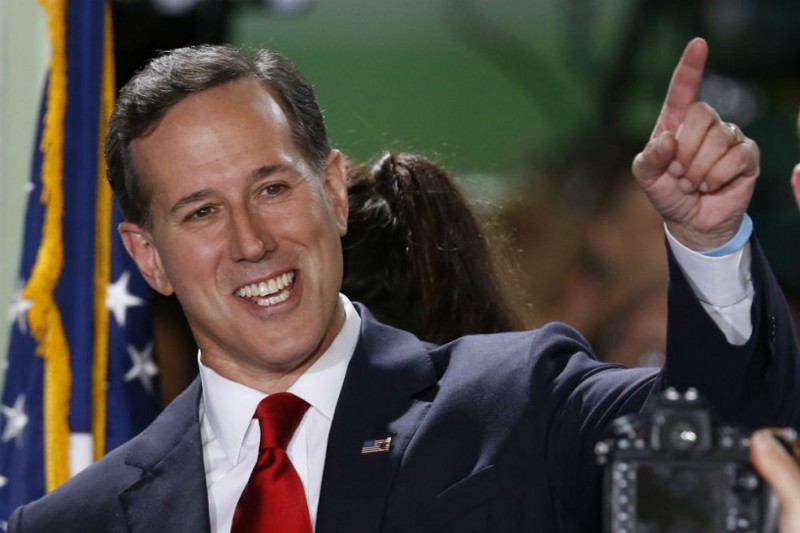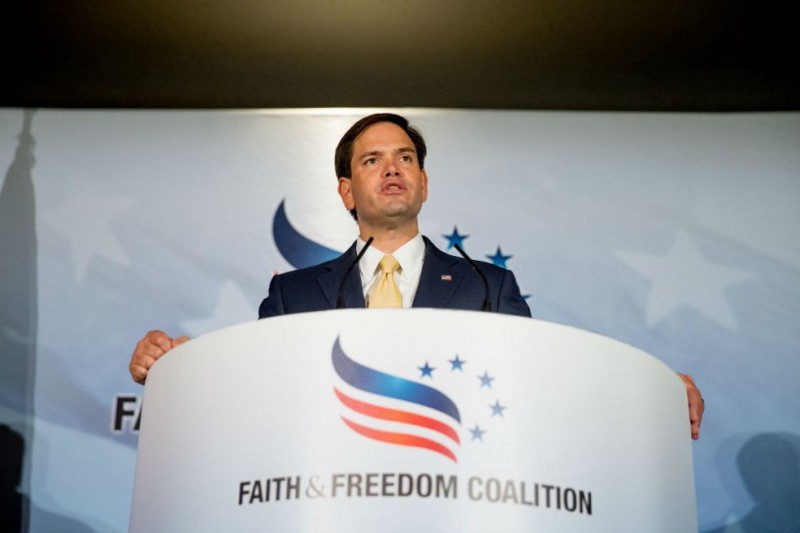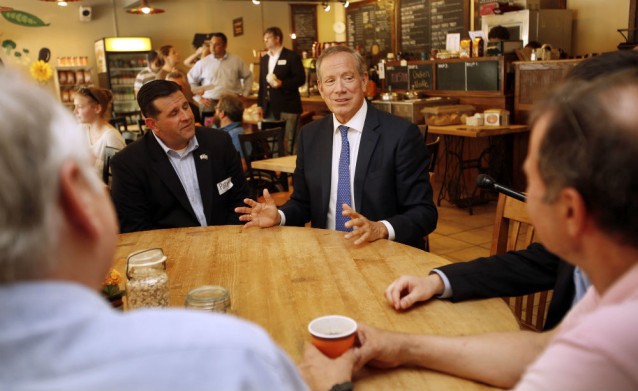Pope Francis released his official encyclical on the environment Thursday, a document that comprehensively spells out the Church’s stances on climate change, the treatment of the natural world and its creatures, and other environmental issues.
The encyclical puts Republicans in an awkward position. Candidates who might agree with the pope on social issues like abortion are now being forced to reckon with a Church that advocates tackling climate change. Though as ThinkProgress has noted, liberals may also experience a similar conundrum — both those running for office and in the public arena. Since being Catholic doesn’t require one to agree with everything the pope says, many might agree with some things and not with others: liberals may support his messages on climate change, for instance, but reject the Church’s historic treatment of gay marriage and contraception.
Among Catholic presidential candidates, few have come out explicitly in support of the pope’s move. Similar to how Catholic members of Congress reacted when Pope Francis said climate change can be attributed mostly to humans, several have either remained silent on the encyclical or criticized the idea that Pope Francis, as a religious leader, should be addressing climate change.
Here’s what all the Catholic candidates for president in 2016 have said so far about the pope’s big statement on climate change.
Martin O’Malley

O’Malley was the only Catholic candidate contacted by ThinkProgress to explicitly support the tenets put forward in the pope’s encyclical.
“Governor O’Malley believes addressing climate change is a moral obligation and he has a track record in Maryland of finding solutions,” Haley Morris, a spokesperson for the campaign, said in an email.
The former governor of Maryland also rolled out a major environmental push on Thursday, coinciding with the pope’s announcement. In a USA Today op-ed announcing the plan, O’Malley said that if elected president, he would make “the transition to a clean energy future” his number one priority. For O’Malley, that priority would include creating a Clean Energy Jobs Corps that would retrofit buildings, create more green spaces, and replant and restore forests. He also said he’d reject the Keystone XL pipeline and projects like it, and would prohibit drilling in Antarctica, Alaska, and the U.S. coast.
“I believe, within 35 years, our country can, and should, be 100% powered by clean energy, supported by millions of new jobs. To reach this goal we must accelerate that transition starting now,” O’Malley wrote.
To get to 100 percent clean energy by 2050, O’Malley plans to set a national Renewable Electricity Standard, a country-wide version of regulation that’s been enacted in 28 states so far and that requires utilities to increase the amount of renewable energy in their power supplies.
“The fact is, there is no either/or choice between our prosperity and protecting our planet — we can create a future where there are more jobs, and a future with a livable climate,” O’Malley wrote. “And there is no future for humankind without a livable climate.”
Like the pope, O’Malley has talked about the moral obligations of tackling climate change before. In 2013, during an address to the Maryland Climate Change Summit, O’Malley referred to the “fierce urgency” of dealing with climate change.
“We are here today because we understand deep in our hearts that we do have a moral obligation to our children and to our grandchildren to give to them a planet that is not on the trajectory that we currently find ourselves in,” he said. “A planet that is becoming increasingly more damaged, more polluted, more unhealthy.”
Jeb Bush

Bush’s campaign didn’t respond to ThinkProgress’ requests for comment, but Bush already hinted at his feelings on the encyclical earlier this week. At a town hall event in New Hampshire Tuesday, Bush said that religion “ought to be about making us better as people and less about things that end up getting into the political realm.”
“I hope I’m not going to get castigated for saying this by my priest back home,” Bush said, “but I don’t get my economic policy from my bishops or my cardinals or my pope.”
Bush added that he’d “like to see what [the pope] says as it relates to climate change and how that connects to these broader, deeper issues before I pass judgment.”
Bush’s views on climate change and religion have, at times, been contradictory. In May, the presidential candidate and brother of George W. Bush said that the science surrounding climate change was “convoluted.”
“For the people to say the science is decided on this is really arrogant, to be honest with you,” he said. “It’s this intellectual arrogance that now you can’t have a conversation about it, even.”
Pope Francis’ top adviser responded to Bush’s comments Thursday, saying that the idea that the pope shouldn’t talk about science “sounds a little bit strange.”
“The Pope is not a scientist,” Cardinal Peter Turkson said. “That does not mean he cannot consult scientists.”
Bush’s comments came a little over a week after Bush hinted in a commencement speech at Liberty University that his faith and environmental views were intertwined, marking a sharp change in the candidate’s rhetoric on the issue.
“America’s environmental debates, likewise, can be too coldly economical, too sterile of life,” Bush said. “Christians see in nature and all God’s creatures designs grander than any of man’s own devising, the endless glorious work of the Lord of Life. Men and women of your generation are striving to be protectors of Creation, instead of just users. Good shepherds, instead of just hirelings. And that moral vision can make all the difference.”
That sounds a little similar to Pope Francis’ words in the encyclical: “The entire material universe speaks of God’s love, his boundless affection for us. Soil, water, mountains: everything is, as it were, a caress of God.”
Rick Santorum

Earlier this month, devout Catholic Rick Santorum told a radio show host that Pope Francis should leave matters of science to scientists.
“The Church has gotten it wrong a few times on science,” Santorum told radio host Dom Giordano. “We probably are better off leaving science to the scientists, and focusing on what we’re really good at, which is theology and morality.”
“When we get involved with controversial and scientific theories, I think the Church is not as forceful and not as credible,” Santorum continued. “I’ve said this to the Catholic bishops many times — when they get involved in agriculture policy, or things like that, that are really outside of the scope of what the Church’s main message is, that we’re better off sticking to the things that are really the core teachings of the Church as opposed to getting involved in every other kind of issue that happens to be popular at the time.”
Santorum’s argument is shaky, because before joining the seminary, Pope Francis studied chemistry and worked as a chemist. What’s more, the scientific passages in the encyclical are based on peer-reviewed work, and multiple scientists have confirmed its accuracy.
But Santorum didn’t stop at those comments: a few days later, he told Fox News Sunday that while “the pope can talk about whatever he wants to talk about,” he’s skeptical of the idea that the pope should use his moral authority to talk about climate change.
“I’m saying, what should the pope use his moral authority for?” Santorum asked. “I think there are more pressing problems confronting the earth than climate change.”
Marco Rubio

Rubio, so far, has been silent on the pope’s encyclical, and his office didn’t respond to requests for comment. But he’s made his feelings about climate change known in the past: he said last year that he doesn’t “believe that human activity is causing these dramatic changes to our climate the way these scientists are portraying. And I do not believe that the laws that they propose we pass will do anything about it. Except it will destroy our economy.”
Rubio’s also made comments on the pope before, noting that he was “not a political figure.”
“Well, look, the pope is a — the pope is a shepherd of a faith. And his desire is peace and prosperity. He wants everyone to be better off,” Rubio said in May.
Rubio is, a spokesperson said in 2010, a “practicing and devout Roman Catholic” who “regularly attends Catholic Mass” and “was baptized, confirmed and married in the Roman Catholic Church.” He’s disagreed with the pope before, specifically on the pope’s role in normalizing U.S. relations with Cuba.
George Pataki

Republican candidate George Pataki, a Catholic who, as Religion News Service has pointed out, has clashed with the Church on certain issues before, called out his fellow Republican challengers for their responses to the encyclical in a tweet Thursday.
The idea @JebBush @marcorubio & @RickSantorum espouse that @Pontifex has no standing on climate change is absurd. #climatechange
— George E. Pataki (@GovernorPataki) June 18, 2015
Pataki, former governor of New York, has one of the strongest records on climate change of all the GOP contenders. He’s been a supporter of clean technology in the past and in 2007 became co-chair of the Council on Foreign Relations’ Independent Task Force on Climate Change.
